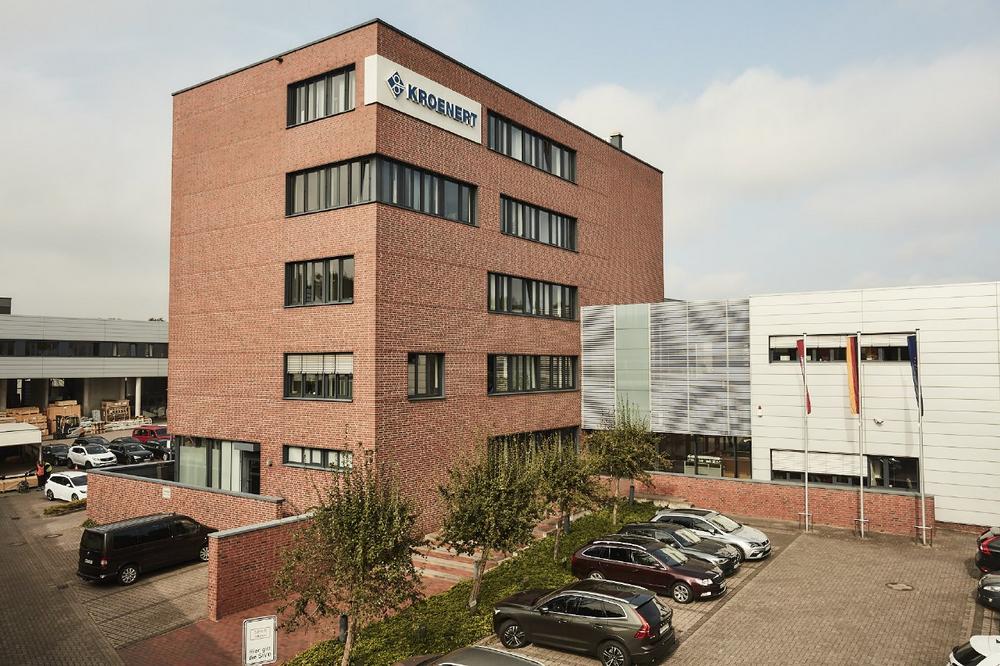Andrea Glawe was R&D Manager, Business Developer and is now Sales Director of the Asia-Pacific region at KROENERT. She reports increasing demand for circular economy solutions.
Do you use recycling and waste avoidance concepts in your own production?
In our offices, in our assembly and in our Technology Centre, where we test our machine and process developments, we separate all waste by type. All employees are required to do this and are instructed accordingly as to which waste belongs where, which recyclable materials are recycled and for which critical substances we call in professional disposal partners. Especially chemical waste and solvents are recycled through these partners.
What Circular Economy solutions do you offer your customers?
As a machine manufacturer, we naturally have only limited influence on which products and packaging materials our customers process with our machines. In the meantime, however, we are increasingly receiving enquiries about the CO2 footprint and the ecological impact of our machines. We are therefore establishing more efficient drying processes and training our customers’ employees to use their machines with optimised energy and resource consumption. Here, ecological, and economic advantages usually intertwine. In some cases, customers can reduce the drying time by half through our process optimisation, which saves energy costs and speeds up cycles at the same time. The switch to recyclable monomer and paper packaging is also gaining in importance. We adapt our customers’ processing procedures and equipment to these materials. This involves both new machines and retrofit projects. A typical task when converting from films to paper is to extend the drying sections, because paper absorbs more water than plastics. Afterwards, the overdried paper also has to be remoistened.
How does the topic affect your research and development as well as cooperations with your customers and their material suppliers?
It is now almost the norm for us to work in development projects in tripartite constellations with our respective customer and a chemical partner. We contribute our process engineering know-how. Only by combining the different perspectives is it possible to establish industry-ready processes with the new materials. In the paper sector, we work together with leading chemical manufacturers, among others, to develop sustainable solutions. The goal is to equip packaging papers with all the necessary barrier properties without compromising their recyclability. Among other things, the aim is to replace extruded polyethylene coatings in Coffee2go cups with a recyclable barrier layer. There is also a trend towards paper packaging for frozen products, snacks, and fatty products, which requires appropriate temperature, UV, oxygen, acid or moisture barriers. As a machine manufacturer, we ensure that our customers can process these papers, including barrier layers, on their machines as usual.
Is the demand for your Circular Competence increasing worldwide – or is this more of a regional phenomenon?
Fortunately, this is a global trend. More and more customers are asking for solutions to replace plastic packaging with paper-based alternatives. In Japan, it is generally mandatory to produce paper packaging wherever possible. The first demand for specific data on the CO2 footprint of our systems also came from there. When new machines are purchased, companies there have to submit overall balances of the processes they implement with them. This raises awareness of the energy demand, which we can influence by optimising drying processes with heat recovery, by using lighter carbon rollers and more efficient drives. But of course, the substrates and consumables that customers use have far more influence on the overall balance. It remains to be said, however, that in many of the countries in which we sell our machines and systems, the focus is increasingly on the environment.
Environmental protection is often driven by regulation. Are the framework conditions right for entering the Circular Economy?
The new Packaging Ordinance in Germany is a step in the right direction. But globally there is still a lot to do. In many places, there is a lack of professional collection systems. As long as this is the case, even recyclable waste often ends up in the residual waste or worse: in nature. In many countries, the problem is obvious. A functioning disposal infrastructure must be built up there quickly. And it is important to sensitise end consumers living there to the waste problem and to the possibilities of waste separation and recycling. We are working in associations to tackle this task and to promote it worldwide through a wide variety of communication channels. With the technological solutions available, much more is feasible than has been implemented so far. In order to realise the potential, ambitious, internationally harmonised regulation would be desirable. Because when carelessly discarded waste ends up in the world’s oceans via rivers, it is usually not the polluter countries that bear the consequences. It is an international problem whose solution requires global approaches in terms of both technology and regulation.
The VDMA Printing and Paper Technology Association is the mouthpiece of around 170 manufacturers of equipment and systems for the printing and print processing, paper manufacturing and converting, and auxiliary materials and equipment sectors from Europe. It thus represents around 90 per cent of the industry. The trade association offers its members services, for example on topics such as trade fairs, public relations, technology and research.
VDMA, Verband Deutscher Maschinen- und Anlagenbau e.V.
Lyoner Str. 18
60528 Frankfurt
Telefon: +49 (69) 6603-0
Telefax: +49 (69) 6603-1511
http://www.vdma.org/
Leiter Kommunikation und Pressesprecher
Telefon: +49 (69) 6603-1922
Fax: +49 (69) 6603-2922
E-Mail: holger.paul@vdma.org
![]()
